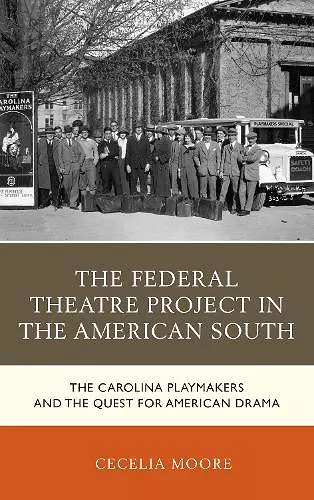The Federal Theatre Project in the American South
The Carolina Playmakers and the Quest for American Drama
Format:Paperback
Publisher:Lexington Books
Published:14th Nov '18
Currently unavailable, and unfortunately no date known when it will be back

This book explores the Federal Theatre Project's influence in the South during the New Deal, highlighting its cultural and political challenges and successes.
This cultural history delves into the Federal Theatre Project's impact in the American South during the New Deal era, highlighting its intricate relationship with racial segregation and conservative politics. It reveals how the project was influenced by distinct regional heritages, and it examines its lasting influence on subsequent generations' discussions about government, art, and cultural expression. The Federal Theatre Project in the American South introduces the key figures and initiatives that played a pivotal role in shaping the regional identity of the project.
In 1935, Hallie Flanagan, a college theatre director, took charge of this New Deal initiative with a vision of creating a national theatre network. This regional approach was not merely organizational; it represented a conceptual framework for a national art form. Flanagan’s involvement in the little theatre movement had already fostered a new American drama that drew from the unique heritage of each region, collectively aiming to illustrate a national identity. The Federal Theatre Project relied heavily on successful regional models, such as the folk drama program at the University of North Carolina, spearheaded by Frederick Koch and Paul Green.
Despite the challenges posed by racial segregation and conservative politics in the South, the Federal Theatre Project found a way to flourish in North Carolina. Community theatres emerged as vibrant spaces where whites and African Americans collaborated. The project also facilitated the creation of The Lost Colony, one of the first outdoor historical dramas. This book recounts the experiences of dramatists, including future novelist Betty Smith and playwright Zora Neale Hurston, as they navigated the complexities of cultural expression and identity in America.
In this engaging book, Cecelia Moore uncovers a vibrant local theatre culture in a time and place when most would suspect those artistic wellsprings had gone dry: the Depression-era South. Moore offers a ground-level look at how, with a big assist from the federal government with the New Deal, people like Frederick Henry Koch, Paul Green, and Joseph B. Christmas labored mightily to introduce and make relevant live theatre to local audiences. Between 1935 and 1939 especially, playwrights and producers, and their benefactors in government and higher education, worked to create drama that would both test and enshrine elements of local history and folkways. Moore’s work successfully weaves together cultural and political history to show the possibilities—and the perils—inherent in the relationship between government and the artistic community. -- Charles J. Holden, St. Mary's College of Maryland
This study provides an excellent addition to the discussion of regional federal theatre programs that illustrates the vital link between the emerging folk theatre movement and the short-lived federal theatre project. It explores the interplay between Frederick Koch and Hallie Flanagan’s visions that emphasized regional American voices and the fraught political zeitgeist of the 1930s American South that ultimately brought the most successful of the WPA arts projects to an end. Of particular interest is the focus on the regional and national political machinations that sought to block the development of a southern federal theatre and thus impede the reach of the more progressive Roosevelt administration. Cecelia Moore has created a long overdue work through which the contributions of the southern federal theatre are able to emerge. -- John Poole, University of North Carolina at Greensboro
ISBN: 9781498526845
Dimensions: 232mm x 167mm x 16mm
Weight: 381g
232 pages